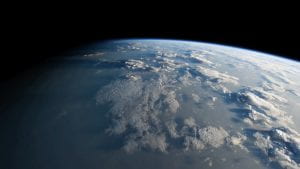By Andy Winfield
 Towards the end of June I went to France for a two week holiday; it was beautiful with diverse landscape, plant life and wildlife causing me to spend large amounts of time tip toeing through meadows looking at the ground in the early evenings. It was also very hot. It was the hottest recorded temperature in France and was a struggle to do very much at all during the day. I found the heat intimidating particularly with the growing realisation with nearly everyone, that these temperatures are going to become the norm. Experiencing the high temperatures that we did was a real wake up call and not a little scary. A few degrees higher and it would have been impossible to even go outside let alone the slow trudging that we did manage before finding some way to stop our blood rising above 37 degrees.
Towards the end of June I went to France for a two week holiday; it was beautiful with diverse landscape, plant life and wildlife causing me to spend large amounts of time tip toeing through meadows looking at the ground in the early evenings. It was also very hot. It was the hottest recorded temperature in France and was a struggle to do very much at all during the day. I found the heat intimidating particularly with the growing realisation with nearly everyone, that these temperatures are going to become the norm. Experiencing the high temperatures that we did was a real wake up call and not a little scary. A few degrees higher and it would have been impossible to even go outside let alone the slow trudging that we did manage before finding some way to stop our blood rising above 37 degrees.
These extreme conditions bring the climate crisis into sharp focus and our responsibilities and responses to it. I’ve worked at the University for nearly twenty years and during that time the planet has had nine of the ten hottest years since records began in 1880; also in that time 78 of 129 recording countries have logged their highest ever temperature with this June the hottest ever recorded. The data, the research and projections are absolutely compelling, so why aren’t all hands to the pump? Perhaps there is more of a focus on financial projections than meteorological ones, perhaps individually (myself included) for many the focus is on the more immediate needs and plans. For students that I talk to in the Garden, the Climate Crisis is their number one issue with many of them urgently protesting in London with the Extinction Rebellion; they are frustrated with a perceived lack of action and responsibility from powerful corporations who they think have young people’s future in their hands. Children are walking out of school to protest about the stealing of their futures.
 The reality is that this crisis is reversible and there exists in our species the scientific and engineering talent to achieve it, although our record isn’t good. There is the widely held belief that we’re in the middle of a global mass extinction of our own making. Plants have taken a huge hit with 571 species wiped out, making Botanic Gardens more important than ever for preserving and recording species; we work hard to educate and communicate the importance of plants in every diverse ecosystem and it is plants that could be a major lifeline to reducing carbon in the atmosphere.
The reality is that this crisis is reversible and there exists in our species the scientific and engineering talent to achieve it, although our record isn’t good. There is the widely held belief that we’re in the middle of a global mass extinction of our own making. Plants have taken a huge hit with 571 species wiped out, making Botanic Gardens more important than ever for preserving and recording species; we work hard to educate and communicate the importance of plants in every diverse ecosystem and it is plants that could be a major lifeline to reducing carbon in the atmosphere.
A couple of things recently have given me glimmers of hope. Firstly was the news that science had solved a problem that scared me when I was young in the 80s, the ozone layer. Recently it has been revealed that due to a global treaty banning the harmful CFCs that were depleting the ozone layer and the scientific data informing the problem, the hole is now closing and will be gone in 50 years when all CFCs have finally dispersed. This success was the result of a collaborative and urgent reaction by major powers which averted a crisis that, although bad, could have been much worse than it was; the 11 year old me wouldn’t have believed it.
International collaboration seems a little way off with this century’s environmental crisis, but science is working hard for solutions. Recent research suggests that planting as many as a trillion trees throughout the world could cut carbon by up to 25%; this calculation excludes agricultural land and cities and is one of the best climate crisis solutions available. This was exciting news and something tangible that can be done, although the effects wouldn’t be felt for a few decades, so we still need to stick to plan A, reducing carbon emissions. Bristol University has set itself the target of becoming a net carbon-neutral campus in ten years which is ambitious, but we can all see the seriousness in which this policy is taken. Impact on climate is something considered with each decision made now.
 In the Garden we see nature close at hand every day and young people who are incredibly concerned that their descendants won’t be able to experience the same pleasure in wildlife that they do. We have the capacity to reverse the crisis and we can all help in a small way to make a difference. It always seems quite preachy when someone tells others what to do without knowing their circumstances, but if everyone did one thing that they weren’t doing before it will make a difference; 72% of global greenhouse gas emissions are the result of household decisions and most climate pollution comes from wealthier countries. So, according to the experts any one of the following will help… plant a tree or two; holiday closer to home; walk or bus if possible; reduce the amount of plastic you use; changing our shopping habits will force suppliers to change their supplying habits; going down to four days a week reduces impact on the climate and increases efficiency; eat less meat; buy fewer clothes; write to your MP to ask what they are doing to change political thinking, tell them that it matters to you, the more they receive the more likely it will be talked about in Parliament and made a larger part of manifestos.
In the Garden we see nature close at hand every day and young people who are incredibly concerned that their descendants won’t be able to experience the same pleasure in wildlife that they do. We have the capacity to reverse the crisis and we can all help in a small way to make a difference. It always seems quite preachy when someone tells others what to do without knowing their circumstances, but if everyone did one thing that they weren’t doing before it will make a difference; 72% of global greenhouse gas emissions are the result of household decisions and most climate pollution comes from wealthier countries. So, according to the experts any one of the following will help… plant a tree or two; holiday closer to home; walk or bus if possible; reduce the amount of plastic you use; changing our shopping habits will force suppliers to change their supplying habits; going down to four days a week reduces impact on the climate and increases efficiency; eat less meat; buy fewer clothes; write to your MP to ask what they are doing to change political thinking, tell them that it matters to you, the more they receive the more likely it will be talked about in Parliament and made a larger part of manifestos.
B

